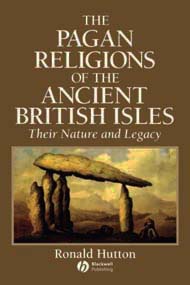The Pagan Religions
of the Ancient Britisch Isles
Their Nature and Legacy
Ronald Hutton
Blackwell Publishing, 1993
'A brilliant synthesis ... Hutton's book gives us by far the best, most
level-headed overview of this fascinating but contentious subject ... To
anyone interested in the rites and religions of ancient Britain and Ireland
this is an invaluable book.'
- Times Literary Supplement
'A fascinating, comprehensive and long-overdue survey of ancient British
religious beliefs ... invaluable for academics and 'earth mystics' alike.'
- The Wiccan
This is the first survey of religious beliefs in the British Isles from the Old
Stone Age to the coming of Christianity, one of the least familiar but most
extensive periods in Britain's history. Ronald Hutton draws upon a wealth of
new data, much of it archaeological, that has transformed interpretation over
the past decade. Giving more or less equal weight to all periods, from the
Neolithic to the Middle Ages, he considers a fascinating range of evidence for
Celtic and Romano-British paganism, from burial sites, cairns, megaliths and
causeways, to carvings, figurines, jewellery, weapons, votive objects, literary
texts and folklore.
The author reveals the important rethinking that has taken place over Christianization
and the decline of paganism, and reviews the exciting progress that has been made
in tracing the survival of pre-Christian beliefs and imagery into the Middle Ages.
Dr Hutton shows how a host of received ideas have been demolished, and how the
pagans of ancient Britain were far more creative, complex, enigmatic and dynamic
than has previously been supposed.
The book contains over a hundred illustrations and will be of wide interest -
to general readers and to students, as well as to historians, archaeologists and
antropologists.
Ronald Hutton was educated at Cambridge and then at Oxford, where he held a fellowship
at Magdalen College. In 1981, he moved to the University of Bristol, where he is now
Reader in British History. He is a historian of wide interests ranging from political
affairs and popular culture to topics covering the whole of the British Isles.
This is his fifth book.
(The text above comes from the back of the book)



